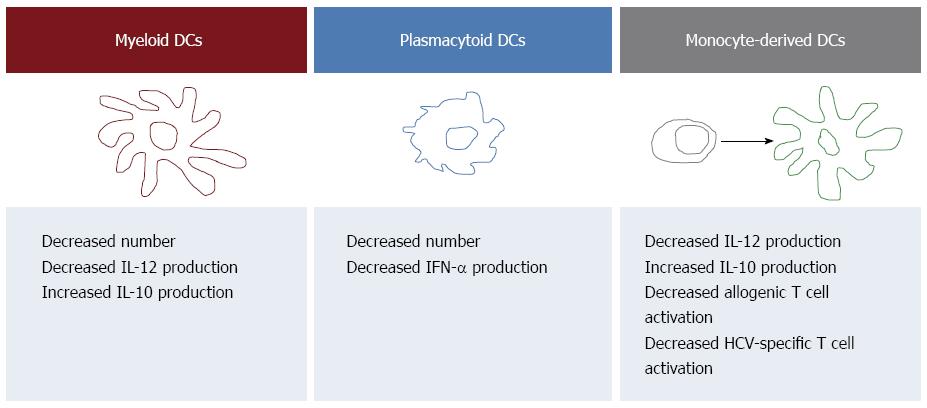Copyright
©The Author(s) 2016.
World J Gastroenterol. Jan 28, 2016; 22(4): 1393-1404
Published online Jan 28, 2016. doi: 10.3748/wjg.v22.i4.1393
Published online Jan 28, 2016. doi: 10.3748/wjg.v22.i4.1393
Figure 1 Summary of the hepatitis C virus-associated alterations of dendritic cells detectable in the peripheral blood.
Patients with chronic hepatitis C undergo changes in the number and function of both myeloid dendritic cells (mDCs) and plasmacytoid DCs (pDCs) that may be relevant to the pathogenesis of chronic HCV infection. In particular, several Authors demonstrated that pDCs, which are specialized in antiviral immune responses, are decreased in HCV-infected patients and are endowed with a reduced ability to produce interferon (IFN). mDCs, that contribute to the activation of cellular immunity through the production of interleukin (IL)12, are decreased as well and characterized by reduced production of IL12 and increased production of the immunosuppressive cytokine IL10. These last functional defects are shared by monocyte-derived DCs that are also endowed with decreased ability to activate T cells. All references are reported in the text.
- Citation: Crosignani A, Riva A, Della Bella S. Analysis of peripheral blood dendritic cells as a non-invasive tool in the follow-up of patients with chronic hepatitis C. World J Gastroenterol 2016; 22(4): 1393-1404
- URL: https://www.wjgnet.com/1007-9327/full/v22/i4/1393.htm
- DOI: https://dx.doi.org/10.3748/wjg.v22.i4.1393









